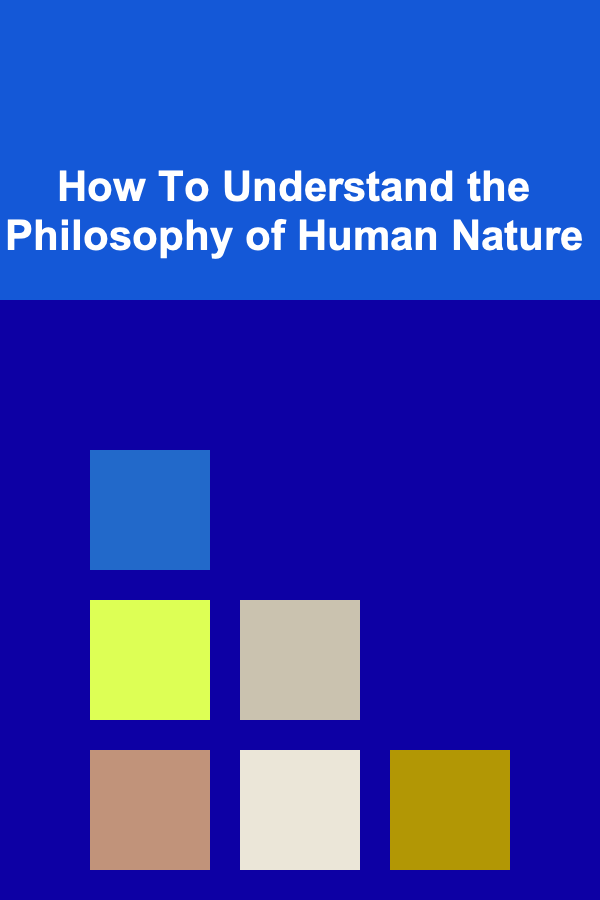
How To Understand the Philosophy of Human Nature
ebook include PDF & Audio bundle (Micro Guide)
$12.99$8.99
Limited Time Offer! Order within the next:

Human nature is a fundamental concept in philosophy that seeks to explore the intrinsic qualities of human beings. The exploration of human nature has shaped philosophical discourse for centuries, influencing how we think about ethics, morality, politics, psychology, and even metaphysics. In this essay, we will delve into the various ways philosophers have approached the concept of human nature, examining key perspectives, debates, and implications. By the end, we will have a comprehensive understanding of how to approach the philosophy of human nature and its relevance to contemporary thought.
The Origins of Human Nature in Philosophy
The question of human nature has existed since the dawn of philosophy. Ancient Greek philosophers like Socrates, Plato, and Aristotle were some of the first to probe deeply into the nature of human beings, asking whether we are inherently good or evil, whether we have free will or whether our actions are dictated by external forces, and what it means to live a "good" life.
In Plato's "Republic," he examines human nature in the context of justice, virtue, and society. He proposes that the soul is divided into three parts: the rational, the spirited, and the appetitive. The balance between these elements shapes human character. For Plato, the philosopher-king, one who embodies wisdom and rationality, is the ideal ruler because their soul is ordered in the most harmonious way. In contrast, those ruled by their appetites or unchecked passions are more likely to succumb to tyranny and corruption.
Aristotle , Plato's student, took a more empirical approach to understanding human nature. In his work "Nicomachean Ethics," Aristotle argues that human beings are rational animals. He emphasizes the role of reason in achieving eudaimonia (flourishing or well-being), which is the ultimate goal of life. Aristotle suggests that the essence of being human is found in our capacity for reason, and by living a life of virtue, guided by reason, we can achieve the highest form of human happiness.
These early philosophical explorations laid the groundwork for later debates on human nature. The idea that humans are essentially rational beings or that human nature is determined by a mix of competing forces would influence many later philosophers, including those of the Enlightenment and modern existentialism.
The Dual Nature of Human Beings: Good or Evil?
A central question in the philosophy of human nature is whether humans are inherently good or evil. This dichotomy has been explored through history, with significant impact on ethics, politics, and theology. Philosophers have proposed several theories on this matter, from the belief in an inherently noble human nature to the view that humans are born with sinful tendencies.
One of the most prominent theological perspectives on human nature comes from Christianity . According to the Bible, humans were created in the image of God but fell from grace with the original sin of Adam and Eve. This concept of original sin suggests that human beings are born with a corrupt nature and are in need of redemption. Augustine of Hippo, a Christian philosopher and theologian, articulated this idea in his works, arguing that humanity is inherently sinful and in need of divine grace to achieve salvation.
In contrast, Jean-Jacques Rousseau , a prominent figure of the Enlightenment, famously claimed that humans were inherently good but were corrupted by society. In his work "The Social Contract," Rousseau describes the "noble savage," a concept where human beings in their natural state, before the influence of society and civilization, are free from the vices of greed, competition, and selfishness. According to Rousseau, it is the development of private property and the establishment of social structures that corrupts human nature, leading to inequality and moral decay.
On the other side of the debate is Thomas Hobbes , who argued that human beings are naturally selfish and that life in the "state of nature" would be "solitary, poor, nasty, brutish, and short." In his work "Leviathan," Hobbes posits that without a powerful central authority, humans would be in a constant state of conflict over resources. For Hobbes, the fear of death and the desire for self-preservation would lead to chaos without a strong social contract to impose order.
These varying perspectives on human nature reveal the complexity of the concept. Are we naturally good or evil? Is society to blame for human vices, or are we inherently flawed? These are questions that continue to shape philosophical discourse and ethical discussions today.
The Role of Free Will in Human Nature
Another critical issue in understanding human nature is the role of free will. Do we have the freedom to make choices, or are our actions determined by biology, society, or some other external factor? The debate on free will versus determinism has been central to the philosophy of human nature for centuries.
Determinism suggests that every event or action is determined by prior causes, and that human beings do not have true freedom of choice. In contrast, free will posits that humans have the ability to make choices independent of prior causes. The tension between these two views has implications for ethics, moral responsibility, and the nature of personal identity.
For example, Baruch Spinoza , a 17th-century philosopher, argued for a deterministic view of human nature. In his work "Ethics," Spinoza contends that everything in the universe, including human thoughts and actions, is determined by the laws of nature. According to Spinoza, human freedom is an illusion, and our actions are merely the result of the unfolding of natural causes.
In contrast, Immanuel Kant , a central figure in modern philosophy, argued for the importance of free will in moral philosophy. Kant believed that moral responsibility requires freedom of choice. In his work "Critique of Pure Reason," Kant distinguishes between the empirical world (subject to the laws of nature) and the noumenal world (the realm of freedom). Kant suggests that human beings are morally responsible because they have the ability to act in accordance with reason, independent of the deterministic forces that govern the physical world.
The problem of free will versus determinism remains unresolved, and continues to shape contemporary debates in both philosophy and science. Can human beings be truly free, or are we simply the product of our biology, upbringing, and environment?
Existentialism and the Search for Meaning
In the 20th century, existentialist philosophers like Jean-Paul Sartre and Martin Heidegger offered a radically different view of human nature. Existentialism is grounded in the belief that humans are not born with a predefined nature or essence, but instead must create their own meaning in life through choices and actions.
For Sartre, human beings are "condemned to be free." In his work "Being and Nothingness," Sartre argues that humans are entirely responsible for creating their essence, and that we are defined by the choices we make. According to Sartre, we are not born with an inherent purpose; rather, we must give our lives meaning through our actions and decisions. This existential freedom, however, comes with anxiety and dread, as we realize the weight of responsibility that accompanies our freedom.
Similarly, Heidegger explored the idea of being in his work "Being and Time." Heidegger suggests that human beings are not merely rational creatures but exist in the world in a way that is shaped by our experiences, relationships, and temporal existence. For Heidegger, human nature is inextricably linked to the concept of being-toward-death, meaning that our awareness of our mortality shapes how we live and find meaning in life.
Existentialism emphasizes the freedom, responsibility, and anxiety that come with being human. It challenges us to consider the nature of our existence not as a fixed essence but as a continual project of self-creation.
Modern Perspectives on Human Nature
In contemporary philosophy, discussions of human nature have been influenced by various fields such as psychology, biology, and sociology. The biological view of human nature, often associated with evolutionary psychology, suggests that many aspects of human behavior are shaped by evolutionary pressures. According to this view, traits such as cooperation, aggression, and empathy may be deeply embedded in human nature as a result of natural selection.
Psychologists like Sigmund Freud and Carl Jung have also contributed to the understanding of human nature by focusing on the unconscious mind and the role of early experiences in shaping personality and behavior. Freud's theory of the unconscious, with its emphasis on repressed desires and instincts, suggests that human nature is often governed by forces that lie outside our conscious awareness.
Sociological perspectives also play a key role in understanding human nature. Emile Durkheim and Max Weber examined how social structures, norms, and institutions influence individual behavior and self-conception. According to sociological theories, human nature is not solely a product of biology or individual will, but is shaped by the social context in which people live.
Conclusion
Understanding the philosophy of human nature involves exploring a wide range of perspectives and theories. From the ancient Greek thinkers who emphasized reason and virtue to the existentialists who challenged us to create meaning in our lives, the philosophy of human nature remains a rich and complex field of inquiry.
The ongoing debates about the inherent goodness or evil of humanity, the role of free will, and the influence of society and biology continue to shape how we view ourselves and others. By reflecting on these different perspectives, we can gain deeper insight into what it means to be human and how we can live more meaningful lives. Ultimately, the philosophy of human nature challenges us to confront the fundamental questions of existence: Who are we? What is our purpose? How should we live? These questions remain as relevant today as they were in the time of the ancient philosophers.

Database Optimization Techniques: Strategies for a Professional DBA
Read More
Effective Strategies for Librarians: Enhancing User Experience and Resource Accessibility
Read More
How to Create a Fishing Gear Inventory Checklist
Read More
How to Set Goals for Your Paperwork Organization Journey
Read More
How to Upcycle Furniture for a Fresh Look on a Budget
Read More
How to Use Spreadsheet Software to Track Tax Prep Expenses
Read MoreOther Products

Database Optimization Techniques: Strategies for a Professional DBA
Read More
Effective Strategies for Librarians: Enhancing User Experience and Resource Accessibility
Read More
How to Create a Fishing Gear Inventory Checklist
Read More
How to Set Goals for Your Paperwork Organization Journey
Read More
How to Upcycle Furniture for a Fresh Look on a Budget
Read More